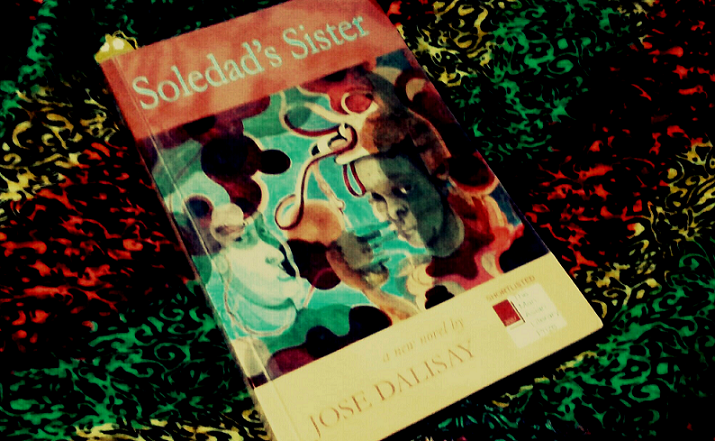As the curtains fall on a stage where we're all performers
"The truth was never just one person's story, or one version of what happened, never a shining absolute but an often filthy and ragged compromise that took not only godly patience to piece together, but also the devil's sureness of the worst of human nature."This was one of the few books that stayed on my shelves for a very long time and I was only able to pick it up now because I knew I had to include it on my Book Diet schedule for this year at long last. Now I've always considered it a great, humbling experience every time I would come across a novel to which I had no kind of expectations for or familiarity with whatsoever; and yet it'd ultimately fill me with clear-cut emotions that defied almost a logical explanation for their being. Jose Dalisay's 2008 fiction Soledad's Sister was exactly just that. It tackled really hard truths with an almost ethereal glow of optimism in its pages while still being able to leave readers an incompleteness that refuses to become whole. It's a troubling experience that personally made it unforgettable.
At its heart, it's an unmistakable tale of two sisters steeped in sweetness and tragedy, both as a hopeless and a fruitful examination of what happens when certain family conflicts never get resolved or find a happier ending. It's also primarily a novel that is so simple and straightforward in concept because it's rather familiar; yet another story that concerns overseas Filipino workers and the loved ones they left behind. Such a story has now become an insistent archetype dealing with themes of loss and opportunity as portrayed through countless middle and low-class Filipinos journeying to foreign lands to become more or less minimum wage workers (more specifically as caretakers) since it seems to be the only decent option to financially provide for their families back home. There is something immediately tragic with this storyline and Dalisay quite deftly approaches the subject with surprising empathy that for me was uniquely devastating. This has a sincere delicacy to it that can be haunting.
The premise is this: a casket with the corpse of one Aurora Cabahug arrived to an airport to be picked up by her next of kin. It turns out that the real Aurora Cabahug is alive. She is an ambitious twenty-one year old singer in a karaoke entertainment bar somewhere in the humble district of Paez, who is taking care of a nephew whose mother hasn't stayed in constant contact with for several months now. It was the police officer and Walter Zamora who notices this anomaly. Retired from a life of investigating brutal crimes, Zamora had met Aurora one night in the bar and could not forget her and so he was eager to fix the mistake concerning the wrongfully identified remains of Aurora's older sister Soledad, who used her identity to get another passport. What follows is a deceptively murder mystery scenario where readers might expect Walter Zamora to "solve" the puzzle on how and why Soledad Cabahug died. They would be mistaken to expect something like that to take place so I must caution anyone not to get stuck on this promising style of narrative because Soledad's Sister is foremost an intimate and leisurely tale about forgiveness and second chances; but mostly it's about hope--what it truly means to hope and live in hope against all odds that would state otherwise; and why there's a recurring painful pattern to that practice. That is the real mystery that can never be solved.
What I love about Soledad's Sister are the lavish descriptions and introspective passages about the two main characters, Aurora and Walter. I find myself drawn and readily sympathetic for them. Dalisay knows how to make readers care about these people which was why I was invested to know how this story will end. He was able to build up both Aurora and Walter with respective strengths and admirable qualities and then, much like with real people, expose us with their harmless deceptions, deep-rooted fears and insecurities and failures along the way. I feel like I know them very well and not at all as soon as the novel wraps up. And the wrap-up itself is just as frustrating. The ambiguous ending could be the defining quality of Soledad's Sister as a whole and it would depend on the type of reader you are on how you would perceive its rather unfair conclusion. If you're a completeist, then this book could be seen as a waste of time because the characters you've learned to root for didn't get a grand pay-off to their emotional struggles. But if you're like me and you enjoy the constant intrigue of a story that is not supposed to be about endings but of beginnings in the first place then you will appreciate the heartfelt and poignant message of Dalisay's book.
His prose is something I really fell in love with; it was magnetic and rife with uncomplicated subtext and imagery that get under your skin quite easily; while also persistently character-driven in its scope, with a sadness in its delivery that's almost akin to tasting one's own sweat and tears. This distinguishing flavor in his prose had rendered me speechless every now and then.
"But duty, she thought, was also a kind of love, perhaps a superior one, even; it had always been about duty, about doing the right thing by and for others, even if they didn't know it, and no matter what it cost."
My favorite character, ironically enough, is Soledad Cabahug who was already dead when this novel began. She was rather pitiful; a woman trapped within the prison of her own guilt for what happened in the past; and yet there are small moments when she was also brave enough to hope for better horizons even if she prioritizes penance and sacrifice as a person. It has made her so deliberately dull without any dreams of her own unlike her younger sister, but it made me love her more deeply. The quoted statement above was written in her point of view of things which demonstrates what a selfless creature Soledad Cabahug is which can also be seen as her foremost flaw. That quote summarizes her as a person and her inclinations to give more than receive something in return.
Her relationship with Aurora was so moving and uncomfortable all at once. I can liken it to the unexplored theme of emotional separation and distance between Frozen characters, Elsa and Anna which were left fully explored because that cartoon must have the happier Disney-twist. Removing that and we get what Soledad and Aurora's relationship as sisters who spent their lives not understanding or knowing one another in spite of living under the same roof but barely interacting meaningfully in a regular basis. It's a more realistic portrayal of such a tragic and fragmented sisterhood and I really appreciated the way Dalisay took his time weaving these emotions within the framework of their respective personalities and struggles.
Overall, Soledad's Sister has the near-perfect simplicity and elegance that one may never expect from a two-hundred paged novel. It has heart and soul and the author has a great understanding on what makes characters sympathetic and easy to root for. It's definitely worth the purchase years ago.
RECOMMENDED: 8/10





Comments
Post a Comment